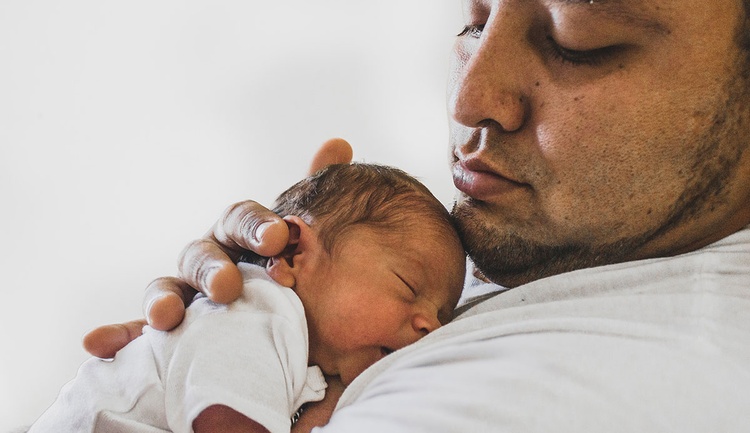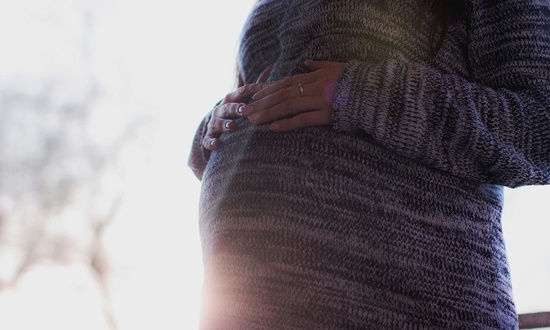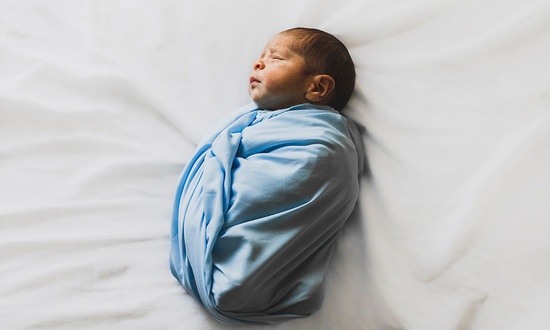Algunos defensores del aborto afirman basar sus creencias en la Biblia. Sostienen que las Escrituras no prohíben el aborto. Están equivocados. La Biblia, de hecho, enfáticamente prohíbe el asesinato de personas inocentes (Éx. 20:13) y claramente considera que los bebés que aún no han nacido son seres humanos dignos de protección (21:22-25).
Job describió en detalle la forma en que Dios lo creó antes de que naciera (Jb. 10:8-12). Lo que estaba en el vientre de su madre no era algo que podría convertirse en Job sino alguien que era Job, el mismo hombre, solo que más joven. Dios le dice al profeta Isaías: «Así dice el Señor que te creó, que te formó desde el seno materno, y que te ayudará» (Is. 44:2). Lo que cada persona es, no simplemente lo que podría llegar a ser, estuvo presente en el útero de su madre.
El Salmo 139:13-16 pinta una imagen vívida de la relación íntima de Dios con una persona nonata. Dios creó las «entrañas» de David no en el nacimiento, sino antes del nacimiento. David le dice a su Creador: «me hiciste en el seno de mi madre» (v. 13). Cada persona, independientemente de su linaje o discapacidad, no ha sido fabricada en una línea de ensamblaje cósmica, sino que personalmente ha sido formada por Dios. Todos los días de su vida están planeados por Dios aún antes de que exista uno solo de ellos (v. 16).
Meredith Kline observa: «Lo más significativo acerca de la legislación sobre el aborto en la ley bíblica es que no hay ninguna. Era tan impensable que una mujer israelita deseara un aborto que no había necesidad de mencionar esta ofensa en el código penal». Todo lo necesario para prohibir un aborto era la orden: «No matarás» (Ex. 20:13). Todos los israelitas sabían que el niño en el vientre de su madre era un niño. Nosotros también, si somos honestos. Todos sabemos que una mujer embarazada está «cargando un niño».
Cada niño en el útero es obra de Dios y parte del plan de Dios. Cristo ama a ese niño y lo demostró volviéndose en uno: pasando nueve meses en el vientre de Su madre terrenal.
Así como niño pequeño y adolescente, los términos embrión y feto no se refieren a no humanos, sino a humanos en diversas etapas de desarrollo. Es científicamente inadecuado decir que un embrión humano o un feto no es un ser humano simplemente porque se encuentra en una etapa más temprana que un bebé. Esto es como decir que un niño pequeño no es un ser humano porque aún no es un adolescente. ¿Alguien se vuelve más humano a medida que crece? Si es así, entonces los adultos son más humanos que los niños, y los jugadores de fútbol son más humanos que los jinetes. Algo que no es humano no se vuelve humano o más humano al envejecer o crecer; lo que es humano es humano desde el principio, o nunca puede ser humano en absoluto. El derecho a vivir no aumenta con la edad y el tamaño; de lo contrario, los niños pequeños y los adolescentes tienen menos derecho a la vida que los adultos.
Una vez que reconocemos que los nonatos son seres humanos, el tema sobre su derecho a vivir debería resolverse, independientemente de cómo fueron concebidos. La comparación entre los derechos de los bebés y los de las madres es desigual. Lo que está en juego en la gran mayoría de los abortos es el estilo de vida de la madre, a diferencia de la vida del bebé. En tales casos, es razonable que la sociedad espere que un adulto viva temporalmente con un inconveniente si la única alternativa es matar a un niño.
Los defensores del aborto desvían la atención de la gran mayoría de los abortos (99 por ciento) al concentrarse en la violación y el incesto debido al factor de simpatía. Dan la falsa impresión de que los embarazos son comunes en tales casos. Sin embargo, ningún niño es un despreciable «producto de violación o incesto», sino la única y maravillosa creación portadora de la imagen de Dios. Tener un hijo y abrazarlo puede hacer mucho más bien por una mujer victimizada que el conocimiento de que un niño murió en un intento por reducir su trauma.
Cuando Alan Keyes se dirigió a estudiantes de secundaria de una escuela en Detroit, una niña de trece años le preguntó si él haría una excepción a su posición pro-vida en casos de violación. Él respondió con esta pregunta: «Si tu padre viola a alguien, y lo condenamos por esa violación, ¿crees que sería correcto que diga: “OK, porque tu padre es culpable de esa violación, nosotros te vamos a matar?”». La clase respondió «No». Cuando se le preguntó por qué una niña debería llevar un embarazo luego de sucederle algo tan horrible, él respondió sabiamente con esta analogía:
Digamos que cuando tienes 19 años, Estados Unidos se involucra en una guerra. Y, cuando esto ha sucedido anteriormente, se ha hecho un reclutamiento militar obligatorio y las personas de tu edad serían reclutadas, y serían enviadas a la guerra, ¿no? Tu te tendrías que ir. Tendrías que vivir en el campo de batalla y arriesgar tu vida. Muchas personas de hecho arriesgaron sus vidas, vivieron dificultades cada día y finalmente murieron. ¿Por qué? Porque estaban defendiendo ¿qué cosa? Nuestro país y defendiendo su libertad. Tuvieron que pasar por dificultades, ¿verdad? Tuvieron que luchar para obtener la libertad.
El principio de la libertad es que nuestros derechos provienen de Dios. ¿Crees que está mal pedirle a la gente que haga sacrificios para mantener nuestro respeto por ese principio? …Pero no creo que sea correcto tomar ese dolor y de hecho empeorarlo …¿Sabes lo que añadiría si te permitiera tener un aborto? Añadiría la carga, el peso de ese aborto. Y en algún momento, la verdad de Dios que está escrita en tu corazón regresa a ti. Y eres herida por esa verdad.
Así que no creo que sea justo, ni para el niño ni para la mujer, dejar que esta tragedia arruine sus vidas; tanto la vida física del niño como la vida moral y espiritual de la madre. Y creo que en esta sociedad hacemos un daño terrible porque no tenemos el coraje de apoyar y defender lo que es verdad. (ProLife Info Digest, 2 de febrero de 2000)
En su libro, Victims and Victors (Víctimas y vencedoras), David Reardon y asociados recurren a los testimonios de 192 mujeres que quedaron embarazadas como resultado de una violación o incesto. Resulta que cuando las víctimas de la violencia hablan por sí mismas, su opinión sobre el aborto es casi unánime y es exactamente lo contrario de lo que la mayoría predeciría: casi todas las mujeres entrevistadas dijeron que lamentaban haber abortado a sus bebés concebidos por violación o incesto. De las que dieron una opinión, más del 90 por ciento dijo que no le aconsejaría a otras víctimas de violación sexual que tuvieran un aborto. Ninguna de las que dio a luz a un niño expresó algún arrepentimiento por haber tenido al bebé.
La imposición de la pena capital al hijo inocente de un delincuente sexual no le hace nada malo violador ni le hace nada bueno a la mujer. Crear una segunda víctima, nunca repara el daño a la primera. El aborto no brinda alivio ni sanidad a una víctima de violación.
Los discípulos de Cristo no entendieron cuán valiosos eran para Él los niños, por lo que reprendieron a los que trataron de acercarlos a Él (Lc. 18:15-17). Pero Jesús dijo: «Dejad que los niños vengan a mí, y no se lo impidáis, porque de los que son como éstos es el reino de Dios». Jesús consideró la atención a los niños como parte esencial de Su reino, no como una distracción.
La visión bíblica de los niños es que son una bendición y un regalo del Señor (Sal. 127:3-5). Sin embargo, la cultura occidental trata cada vez más a los niños como obstáculos. Debemos aprender a ver a todos los niños como Dios los ve, y debemos actuar a favor de ellos como Él nos manda. Debemos defender la causa de los débiles y huérfanos; mantener los derechos de los pobres y oprimidos; rescatar a los débiles y necesitados; y librarlos de los malvados (Sal. 82:3-4).
Cristo dijo que lo que hagamos o no hagamos por los niños más débiles y vulnerables, lo hacemos o no lo hacemos para con Él. En el día del juicio, «El Rey les dirá: “En verdad os digo que en cuanto lo hicisteis a uno de estos hermanos míos, aun a los más pequeños, a mí lo hicisteis”» (Mt. 25:40).
Este artículo fue publicado originalmente en la Tabletalk Magazine.
Abortion
Some "pro-choice" advocates claim to base their beliefs on the Bible. They maintain that Scripture does not prohibit abortion. They are wrong. The Bible does, in fact, emphatically prohibit the killing of innocent people (Ex. 20:13) and clearly considers the unborn to be human beings worthy of protection (21:22–25).
Job graphically described the way God created him before he was born (Job 10:8–12). That which was in his mother's womb was not something that might become Job, but someone who was Job—the same man, only younger. To the prophet Isaiah, God says, "Thus says the Lord who made you, who formed you from the womb and will help you" (Isa. 44:2). What each person is, not merely what he might become, was present in his mother's womb.
Psalm 139:13–16 paints a vivid picture of God's intimate involvement with a preborn person. God created David's "inward parts" not at birth, but before birth. David says to his Creator, "You knitted me together in my mother's womb" (v. 13). Each person, regardless of his parentage or handicap, has not been manufactured on a cosmic assembly line, but personally formed by God. All the days of his life are planned out by God before any come to be (v. 16).
Meredith Kline observes: "The most significant thing about abortion legislation in Biblical law is that there is none. It was so unthinkable that an Israelite woman should desire an abortion that there was no need to mention this offense in the criminal code." All that was necessary to prohibit an abortion was the command, "You shall not murder" (Ex. 20:13). Every Israelite knew that the preborn child was a child. So do we, if we are honest. We all know a pregnant woman is "carrying a child."
Every child in the womb is God's handiwork and part of God's plan. Christ loves that child and proved it by becoming like him—He spent nine months in His mother's womb.
Like toddler and adolescent, the terms embryo and fetus do not refer to nonhumans but to humans at various stages of development. It is scientifically inaccurate to say a human embryo or a fetus is not a human being simply because he is at an earlier stage than an infant. This is like saying that a toddler is not a human being because he is not yet an adolescent. Does someone become more human as he gets bigger? If so, then adults are more human than children, and football players are more human than jockeys. Something nonhuman does not become human or more human by getting older or bigger; whatever is human is human from the beginning, or it can never be human at all. The right to live does not increase with age and size; otherwise, toddlers and adolescents have less right to live than adults.
Once we acknowledge that the unborn are human beings, the question of their right to live should be settled, regardless of how they were conceived. The comparison between babies' rights and mothers' rights is unequal. What is at stake in the vast majority of abortions is the mother's lifestyle, as opposed to the baby's life. In such cases, it is reasonable for society to expect an adult to live temporarily with an inconvenience if the only alternative is killing a child.
Pro-choice advocates divert attention from the vast majority of abortions (99 percent) by focusing on rape and incest because of the sympathy factor. They give the false impression that pregnancies are common in such cases. However, no child is a despicable "product of rape or incest" but God's unique and wonderful image-bearing creation. Having and holding a child can do much more good for a victimized woman than the knowledge that a child died in an attempt to reduce her trauma.
When Alan Keyes addressed middle school students at a school in Detroit, a thirteen-year-old girl asked if he would make an exception for rape in his pro-life position. He responded with this question: "If your dad goes out and rapes somebody, and we convict him of that rape, do you think it would be right for us to then say, 'OK, because your dad is guilty of that rape, we're going to kill you? '" The class answered "No." When asked why a girl should have to go through a pregnancy when something so awful happened to her, he wisely answered with this analogy:
Let's say that when you are 19, America gets involved in a war. And, when we've gotten involved in wars in the past, we had a draft and the people your age would be drafted, and they'd be sent off to war, right? You are going to have to go off. You are going to have to live on a battlefield. You are going to have to risk your life. And many people did in fact risk their lives, lived in hardship every single day and finally died. Why? Because they were defending what? Our country and defending its freedom. They had to go through hardship, didn't they, for the sake of freedom.
The principle of freedom is that our rights come from God. Do you think it's wrong to ask people to make sacrifices to keep our respect for that principle? . . . But I don't believe it is right to take that pain and actually make it worse . . . do you know what I'm adding if I let you have an abortion? I'm adding the burden of that abortion. And at some point, the truth of God that is written on your heart comes back to you. And you're wounded by that truth.
So I don't think it's fair, not to the child and not to the woman, to let this tragedy claim both their lives; the physical life of the child and the moral and spiritual life of the mother. And I think in this society we do both terrible harm because we don't have the courage to stand by what is true. (ProLife Info Digest, Feb. 2, 2000)
In their book, Victims and Victors, David Reardon and associates draw on the accounts of 192 women who experienced pregnancy as the result of rape or incest. It turns out that when victims of violence speak for themselves, their opinion of abortion is nearly unanimous and the exact opposite of what most would predict: nearly all the women interviewed said they regretted aborting their babies conceived via rape or incest. Of those giving an opinion, more than 90 percent said they would discourage other victims of sexual violence from having abortions. Not one who gave birth to a child expressed regret.
Imposing capital punishment on the innocent child of a sex offender does nothing bad to the rapist and nothing good to the woman. Creating a second victim never undoes the damage to the first. Abortion does not bring healing to a rape victim.
Christ's disciples failed to understand how valuable children were to Him, so they rebuked those who tried to bring them near Him (Luke 18:15– 17). But Jesus said, "Let the children come to me, and do not hinder them, for to such belongs the kingdom of God." He considered attention to children to be part of His kingdom business, not a distraction.
The biblical view of children is that they are a blessing and a gift from the Lord (Ps. 127:3–5). However, Western culture increasingly treats children as liabilities. We must learn to see all children as God does, and we must act toward them as He commands us to act. We must defend the cause of the weak and fatherless; maintain the rights of the poor and oppressed; rescue the weak and needy; and deliver them from the wicked (Ps. 82:3–4).
Christ stated that whatever we do or do not do for God's weakest and most vulnerable children, we do it or do not do it to Him. At the judgment, "The King will answer them, 'Truly, I say to you, as you did it to one of the least of these my brothers, you did it to me'" (Matt. 25:40).
Originally published in Tabletalk.
Photo: Pexels




